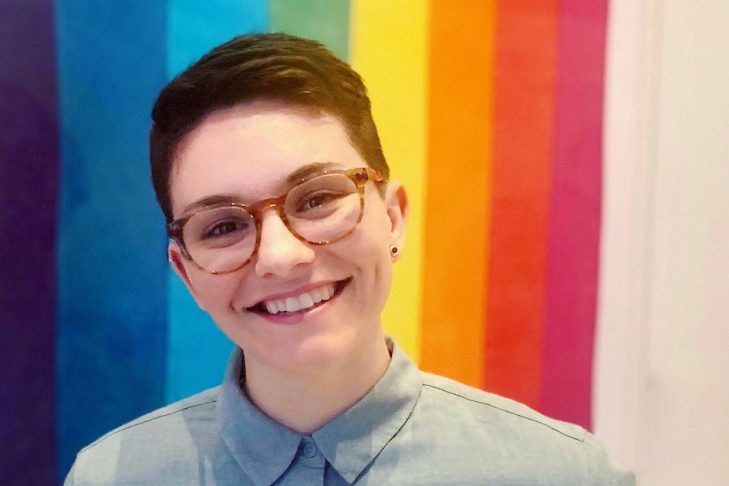Ze’evi Berman lives and breathes Judaism and social justice activism. The third-year cantorial student at Hebrew Union College – Jewish Institute of Religion (HUC) is one of six students to receive the T’ruah Rabbinical and Cantorial Student Summer Fellowship in Human Rights. Berman, a Newton native and alum of Camp Eisner in the Berkshires, grew up at Temple Shalom in Newton. For Berman, the Reform congregation was one of their inspirations to enter the cantorate. “The cantors at Temple Shalom and the song leaders at Eisner showed me I loved Jewish music. It’s a powerful tool and one of the things I value most,” they recently told JewishBoston.
Berman combines their love of music with social justice activism and an ongoing desire to study Jewish text. As part of their application to T’ruah, they wrote an essay in which they closely read one of the 18 benedictions of the Amidah—a central prayer featured in Jewish liturgy. Berman chose a blessing that was originally called the “ingathering of the exiles.” “The benediction was changed in Mishkan Tefillah—the Reform Jewish prayer book,” they explained. “Modern rabbis and cantors rewrote the blessing to reflect the spread of social justice outward until it reaches the four corners of the earth. It was a beautiful reversal of the ancient text. In my interview for T’ruah, I spoke further about why social justice will be one of the most important things I will build into my future cantorate.”
Berman is also a proponent of pluralism, something that is reflected in their six-person T’ruah cohort. “We span the gamut of Judaism, from Reform to different forms of Orthodoxy,” they said. “I’m excited to spend the summer working and learning from them. Each of the fellows will spend three days a week at their internship and two days a week studying and interacting with the cohort.”
Berman is interning this summer at Faith in New York. They intentionally chose an organization with an interfaith focus. “There are amazing social justice campaigns in other organizations,” Berman said, “but I love that Faith in New York does their work through a religious lens. And it’s not just one faith, but many faiths.”
Related
Berman credits their first exposure to social justice work to their experience of coming out as queer in high school. They were active in their gay straight alliance group and went on to establish a chapter of GLSEN, an advocacy organization for LGBTQ youth and high school students. “I worked on initiatives to make our school more educated, open and accepting of LGBTQ people,” Berman said. “Since then, the communities I’ve become involved in a Jewish way have always had social justice as one of their most important pillars.”
A graduate of Bennington College with a degree in vocal performance, Berman moved to New York City to attend HUC. They recall that when they first came to New York, the Black Lives Matter (BLM) movement was gaining attention. Berman was an intern at Romemu, a post-denominational congregation, which its website describes as a place for “spiritual seekers and skeptics alike. … We are committed to helping to birth a post-denominational Judaism that transcends ideologies and labels, that is joy-based and contemplative, ecstatic and reverential, connected to our tradition, yet open to truth, wherever it is found.”
Berman’s social justice bona fides also include volunteering with Jews for Racial and Economic Justice, where they worked in partnership with BLM. “I did a lot of community organizing and mobilization surrounding BLM issues, and marched with BLM,” Berman said.
As for the future, Berman wants to work as a pulpit cantor. They note there is a long history of rabbis who choose to work outside the pulpit to do nonprofit work, while cantors, on the other hand, are more likely to serve in a congregation. “Music is such an integral part of a congregation and community,” Berman said. “I love leading services and building community based on the values of social justice.”
In the here and now, Berman said they are grateful to T’ruah “to have this opportunity to be involved with hands-on social justice work. I’m excited to learn how to be an effective community organizer.” They are also excited that the fellowship will enable them “to acquire the tools to understand how to do effective community building, and to bring Jewish values and Jewish texts to social justice building and our future congregations.”





